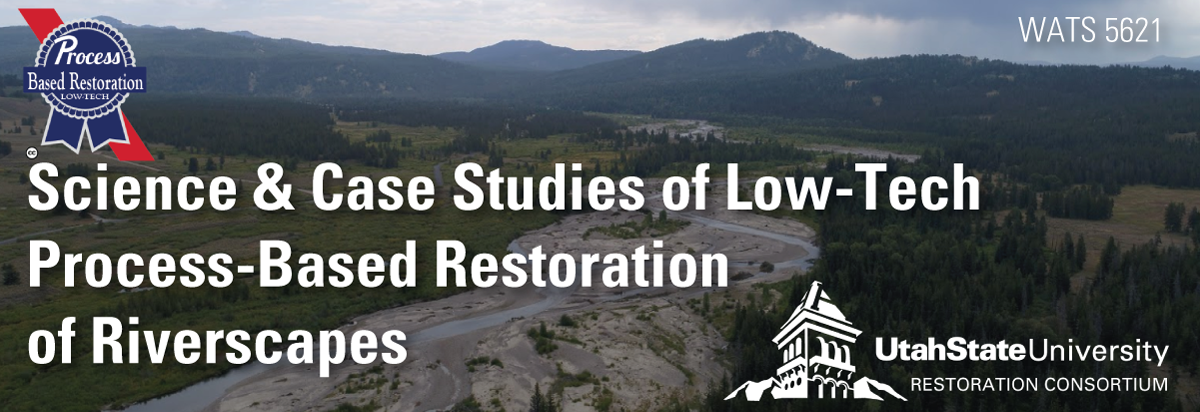WATS/CEWA 5621 - Science & Case Studies of LTPBR

Catalog Description
Students explore the science and case studies that support Low-Tech Process-Based Restoration of riverscapes. Through readings, discussions, and case study reviews, students will gain exposure to key experiments and identify where scientific knowledge gaps remain.
| Title | Science & Case Studies of Low-Tech Process-Based Restoration of Riverscapes |
|---|---|
| Semester Offered | Spring |
| Credits | 1.0 Credit (1.5 CEU) |
| Levels | Graduate / Undergraduate |
| Schedule | Hybrid Face-to-Face Lecture |
| Course Number | WATS 5621 (cross-listed CEWA 5621) |
← Back to Spring 2025 LTPBR Courses
Schedule
Spring 2025 - Science of LTPBR
- Matriculated USU Students: SCI&CASE STUD LOWTECH RIV - 16918 - WATS 5621
- Non-USU / Professional Students: CEWA 5621 (Register here)
Registration opens November 6, 2024.
| Class | Time | Days | Where | Dates | Instructor |
|---|---|---|---|---|---|
| Science & Case Studies of LTPBR | 1:30–4:15 pm MST | Tuesdays | Zoom | Feb 18, 25, Mar 4, 2025 | Nicolaas Bouwes |
This course is based on Module 2 of the self-paced materials.
Access Module 2 Materials (slides, videos, exercises)
Course Outline
Students will view pre-recorded lectures and complete readings before each discussion session.
| Date | Module | Topics |
|---|---|---|
| Feb 18 | 2.1 | Review & Introduction + Building Resilience Case Studies |
| Feb 25 | 2.2 | Bridge Creek & Birch Creek Case Studies + Asotin Creek |
| Mar 4 | 2.3 | State of Supporting Science & Knowledge Gaps |
Fees
-
Matriculated Students: USU standard tuition rates for 1 credit (no extra course fee).
Register on Banner. -
Continuing Education Students: $315 (includes $270 course fee + $45 CEU processing fee). Registration opens November 6.
Course Objectives
By the end of this course, students will:
- Indicate what scholarly literature supports low-tech process-based restoration.
- Understand how case studies and scientific results build confidence in treatments like BDAs and PALS.
- Recognize knowledge gaps that still exist for advancing the science of LTPBR.
Instructors
Lead Instructor:
- Nicolaas Bouwes
Aquatic Ecologist, Adjunct Professor, USU
Principal at Anabranch Solutions
Office hours: by appointment (contact via Canvas)
Instructor Affiliations
Course Resources
Slides, videos, and readings will be provided in Canvas. Assignments and grading rubrics will also be posted there.
Access Module 2 Course Materials
Required Texts
-
Low-Tech Process-Based Restoration of Riverscapes: Design Manual
Free PDF or purchase print on Amazon or BookBaby -
Pocket Field Guide
Free PDF or purchase a waterproof version here
Recommended Focus: Chapters 1 and 2 of the Design Manual.
Grading
| Grade | Range |
|---|---|
| A | 93–100% |
| A- | 90–92.9% |
| B+ | 87–89.9% |
| B | 83–86.9% |
| B- | 80–82.9% |
| C+ | 77–79.9% |
| C | 73–76.9% |
| C- | 70–72.9% |
| D+ | 67–69.9% |
| D | 60–66.9% |
| F | below 60% |
University Policies
Attendance
Attendance and participation in discussion sessions is expected. See USU Attendance Policy.
Academic Integrity
All students are expected to follow USU’s Honor Pledge:
"I pledge, on my honor, to conduct myself with the foremost level of academic integrity."
Academic misconduct including plagiarism, cheating, and falsification will not be tolerated.
Diversity & Inclusion
USU supports an inclusive learning environment. For concerns, contact:
Accommodations
Students with disabilities are encouraged to contact the Disability Resource Center early in the semester to arrange accommodations.
Mental Health
USU provides free counseling services through CAPS. The SafeUT app is also available for 24/7 mental health support.